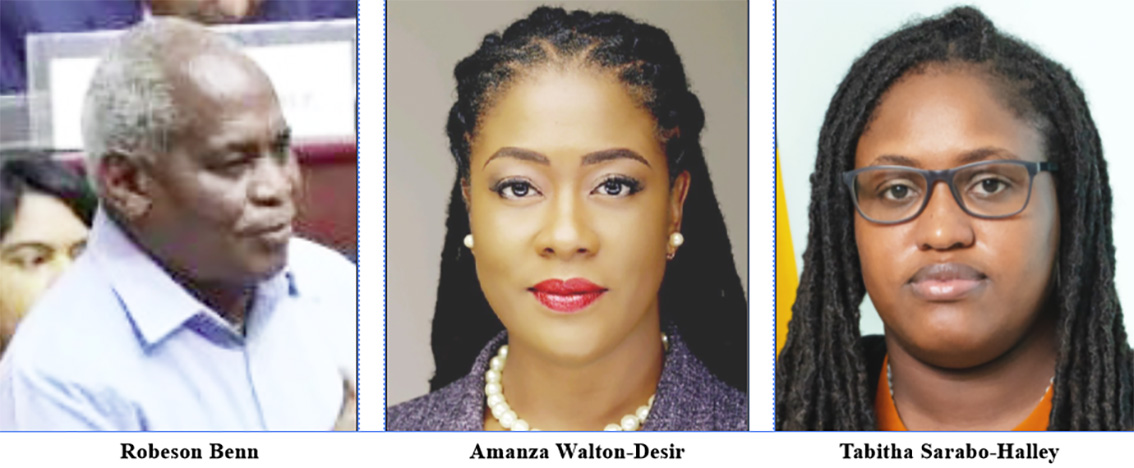While 21,782 Venezuelan migrants have been registered in nine administrative regions as of July 11, 2020, the parliamentary opposition continues to question whether the government has taken any steps to modernise the associated institutional and legislative framework since 2020.
This was the question posed by Opposition Parliamentarian Tabitha Sarabo-Halley to Home Affairs Minister Robeson Benn at the 69th sitting of the National Assembly on Monday.
Benn said that the government through the Ministry of Home Affairs has made significant strides in modernising its migration services, and information and data collection systems since August 2020, but in the same breath said that while no bill has been laid in parliament, the administration is exploring various options relating to migration policies.
“In respect of the institutional framework relating to migration, both the Immigration Department and the Immigration Services Department have been modernised [and] staffing has increased. The work that they are doing now… is being put on electronic platforms for proper recovery of information from the databases”, he said.
The minister noted that the government is working assiduously to ensure persons purporting to be migrants in Guyana are indeed immigrants,
“We inherited a situation where thousands of persons were coming through Guyana purporting to be migrants but not staying in Guyana… In 2019, 19,000 persons came into Guyana and cannot be accounted for,” Benn said.
“We do not want to repeat and we are working to ensure that the system is much better managed and is outside the influence of corruption at all levels.”
The Home Affairs Minister was also requested by Sarabo-Halley to inform the National Assembly of the number of registered Venezuelan migrants in Region Nine as of June 16, and the other regions as of July 11.
Benn in response gave the breakdown this per region: Region Nine – 1,348; Region One – 10,671; Region Two – 3,255; Region Three – 1,114; Region Four – 1,215; Region Seven – 4,099; and Region Eight – 80.
According to the Minister, no data has been recorded for Region Ten as Venezuelans don’t reside in that administrative zone.
Specific patrols
He also said that the Home Affairs Ministry is focussed on establishing specific patrols to identify undocumented individuals, and to ensure that they are legally registered following as question posed by Foreign Affairs Shadow Minister Amanza Walton-Desir in that regard.
Benn informed the Assembly that a number of persons, primarily Venezuelan nationals, are now willing to be documented amid the ministry’s intervention for this to be implemented.
Minister of Foreign Affairs Hugh Todd in November had stated that some 80 per cent of migrants from Venezuela are either Guyanese or of Guyanese parentage.
He made this disclosure during the extraordinary sitting of the National Assembly where both Government and the Opposition unanimously voted in favour of the motion which reaffirmed the 1899 Arbitral Award settling the boundary between Guyana and Venezuela. It also rejected the controversial Venezuelan referendum on Essequibo which was held on December 3rd.
The minister’s comments came following a proposal by Shadow Foreign Affairs Minister, Amanza Walton-Desir, that the government should introduce legislation in the National Assembly that would regulate the influx of Venezuelan migrants into Guyana.
Walton-Desir who endorsed the motion which reaffirmed Guyana’s sovereignty over Essequibo, contended that “there is an active incursion of persons from Venezuela as well as those returning from the Spanish-speaking territory and are entitled to Guyanese citizenship.”
She had contended that despite the human rights conventions and international laws which require the fair treatment of migrants where they are entitled to food, shelter, clothing and other amenities, this doesn’t prevent Guyana from promulgating legislation that sets out clearly how it deals with this issue.
In February this year the government’s estimate of migrants who had entered Guyana from Venezuela was around 40,000. This comprised nationals of the country, Guyanese-Venezuelans who had lived there for several decades as well as nationals from other countries who had been living in Venezuela.
According to immigration records the figure was 20,000, but it was explained that the difference was accounted for by a distinction being made between those who had been born in Guyana but had lived in Venezuela for a long time and were not recorded as migrants when they returned with their families, and those who were not born here.
As of March 28 this year, an inter-agency group led by the United Nations High Commissioner for Refugees (UNHCR) and the International Organization for Migration, estimated the number of Venezuelan refugees and migrants in the world at 7,239,953, of which 6,095,464 had taken refuge in Latin America and the Caribbean.






